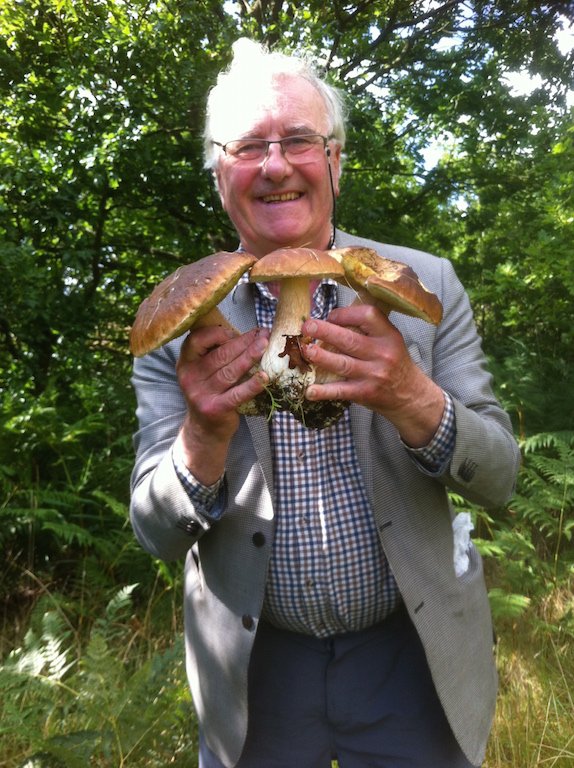
I first met Richard Fortey about 15 years ago at one of those dinners when you bring something to show and tell. I think he brought a favourite trilobite. He was a world authority on these ancient creatures, having written some 250 papers about them during his career at the Natural History Museum. Among other things, he used trilobite fossils to determine the course of prehistoric coastlines. When someone once asked him what he did, Fortey answered wryly that he had that day ‘moved North Africa 200km to the east’. What I remember most about that encounter, apart from his friendliness and easy rapport, was that, despite being a renowned palaeontologist and FRS, he thought of himself first and foremost as a naturalist. He was a polymath who loved natural landscapes and all wildlife, and with a deep interest in fungi; he was one of our best field mycologists. The moment he had a bit of money to spare from his broadcasts for BBC 4, Fortey bought four acres of ancient woodland near his home in Henley. And then, characteristically, and after many observations, wrote a book about it (The Wood for the Trees, 2016, subtitled – for he liked a subtitle – The Long View of Nature from a Small Wood).
Like so many of us, Fortey caught the bug at an early age. He described his formative life as a naturalist in detail in another book, A Curious Boy (2021) – curious in the old sense of possessing an abundance of intelligent curiosity. It ends when he gained a first at King’s College, Cambridge, and embarked on his long career at the Museum, a professional life spent on doing what he most enjoyed. Had he ended up instead as a plumber, say, I suspect he would still have made a notable contribution to the study of fossils.
Outside the Museum, Fortey gained fame as an author and broadcaster on science and natural history. His second book, The Hidden Landscape (1993), revealed the geological formations of Britain lying just beneath the surface skin. It was the work of a born writer and communicator, written in an easy, accessible style, full of engaging anecdote and well-digested knowledge, and warm without being unduly showy. It deservedly won the Natural World Book of the Year award, and, for a book about geology, did extremely well.
His subsequent books, most of them published by Collins, revealed the breadth of his interests. Life: An Unauthorised Biography (1997) tackled the story of life from primordial slime to the human brain (he likened the shape and tempo of that long history to Ravel’s Bolero, a convergence that probably would not have occurred to many scientists). After that came the book Fortey was born to write, Trilobite! Eyewitness to Evolution (2001), a reconstruction of the lives of this humble organism that managed to survive a full quarter of a billion years all over the ancient world. Dry Store Room No. 1 (2008) was an affectionate history of the work of the Museum, centred on the place where miscellaneous objects were kept. Survivors: Animals & Plants Time Left Behind (2011) was devoted to the ‘living fossils’ that are still with us, one of them being the horseshoe crab. By a long zoological tradition (the crab is a distant relation of the trilobite), Fortey once forced himself to eat one, noting that it had a ‘rather overwhelming’ taste of rancid fish.
His last book, a personal favourite, was Close Encounters of the Fungal Kind (2024; reviewed on p. 467), subtitled In Pursuit of Remarkable Mushrooms. In the same easy, engaged style as the others, it explores the strange lives and extraordinary diversity of fungi, drawing on his own experience of foraying in the woods and fields. What is perhaps less well known, and wholly unexpected, is the humorous book he wrote under a pseudonym in 1981: The Roderick Masters Book of Money Making Schemes, subtitled How to Become Enormously Wealthy with Virtually no Effort. Sold today with a po-faced warning, Not to be taken seriously, it is full of terrible and very funny ideas on how to cheat one’s way to a fortune.
Richard Fortey was regarded as one of the best science popularisers and was a mentor to many. Affable, modest, humorous, and an eternal enthusiast, he was well-liked, and his memorial service at Dorchester Abbey on 27th March was packed. He was a family man with four children and, though very well-travelled, his favourite place was where he ended up, in the Chilterns, with baskets of foraged fungi and the ‘cabinet of curiosities’ he built in his wood. Of all the people I have known, his is the career I would most have liked to have had (or at least had the most empathy with). Kids, work hard at school! It is worth it. He was a great and gifted naturalist and will be much missed.
